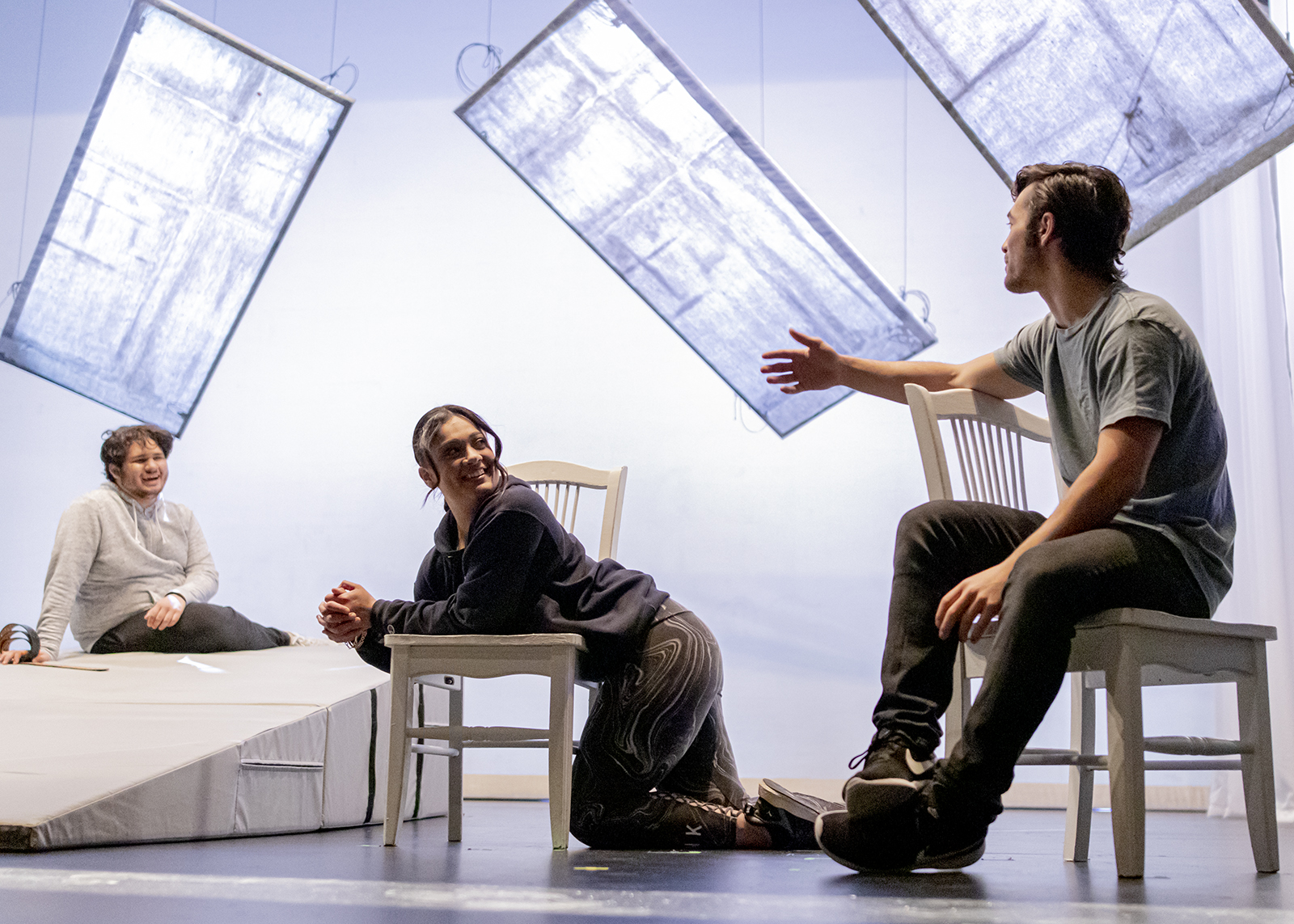Theater production challenges traditions via magical realism, diverse characters

Graduate theater student Mark Anthony Vallejo is directing “Lydia” as his thesis play. He said the production’s plot and themes show a Mexican American family trying to cope in the wake of tragedy, coming together to create his first play honoring his own Chicano heritage and background. (Esther Li/Daily Bruin)
"Lydia"
Through March 7
The Little Theater
$25
By Jessica Li
March 1, 2020 10:58 p.m.
Nothing is off limits in “Lydia,” in which secrets are exposed and emotions run high.
Graduate theater student Mark Anthony Vallejo is directing the production as his thesis play, which will run through March 7 in the Macgowan Hall Little Theater. Vallejo said the production explores themes that range anywhere from finding one’s identity to adultery and incest. It follows a Mexican American family trying to cope in the wake of a tragedy, with a bilingual script filled with Spanish slang, he said.
“I was reading ‘Lydia,’ and there were a lot of things that struck me, because I lived through this life, and I’m living this life that the family deals with,” Vallejo said. “I was angry at the play, and at the same time, there were moments where I loved it, and other times where I didn’t know why one scene was in there.”
[Related: Rob Clare will highlight women’s woes in his version of ‘Troilus and Cressida’]
For Vallejo, the production will be the first time he directs a play honoring his own Chicano heritage and background. “Lydia” has allowed him to connect to his East Los Angeles roots as well as the slang and style of language where he grew up. For instance, he has been able to draw on his own experiences attending quinceaneras and using phrases like “ese,” a term connoting friendship, and “simon carnal,” which roughly translates to “of course, my friend,” in English.
Originally written by Octavio Solis, Vallejo said “Lydia” highlights both the defining aspects of the Mexican American and universal human experience through its tight-knit seven-member cast and elements of magical realism.
“Lydia” begins with a scene featuring one of the main characters, Ceci, who has been left quadriplegic after a car accident. Although she is physically disabled, magical realism allows her to spring up at moments and deliver monologues expressing how she feels about what’s happening around her, said first-year theater student Julia Prudencio, who plays Ceci.
“Just having to voice the inner thoughts of somebody who’s experienced horrible trauma and is now stuck inside her body was liberating,” Prudencio said. “Just because she can’t verbalize it doesn’t mean that she can’t comprehend the tragedy of what her family is going through.”
To further highlight the actors’ performances, Vallejo said part of his vision was to stray away from extravagant set design and lighting and instead use more modest background colors and decorations. By making the set background a monotone gray or white, he aimed to strip away distractions and accentuate the characters’ vulnerability. Ceci is brain dead, and the four walls suspended in the air and white chairs take the audience into her mind during her monologues, Vallejo said.

The simplicity in set design allows for costumes to stand out, and it also intentionally contrasts with the costumes, said graduate student and costume designer Saloni Mahajan. Mahajan said she worked with Vallejo to combine the set and costume design together, using block colors in the characters’ clothing to either match or stand out against the background. As an international student, Mahajan said she saw “Lydia” as an opportunity to learn about other cultures.
“As a costume designer, I want to work on different cultures because I understand the value of (culture) and how emotionally people are connected with it,” Mahajan said. “I really want to understand how the character feels and how the actor feels, and it was obviously a huge help that the actors are from this specific culture and they understand the language.”
Mahajan decided to infuse classic ’70s-era clothes with deliberate color choices depending on the character. As the titular character enters the scene, she said the marked color of Lydia’s clothes contrasts with the grey and monotone colors of the rest of the cast; the shade represents the livelihood she exudes that other characters do not. However, as the play goes on, Mahajan said the clothing colors shift, corresponding to characters giving away or absorbing life throughout the production.
[Related: Outdoor Shakespeare readings bring the Bard to a more social, casual environment]
Lydia’s entrance into the play in particular signals a change in how the characters interact with each other, said third-year theater student Camila Rozo. As an immigrant from Colombia herself, Rozo said she related to Lydia’s own immigrant Latina background. Nevertheless, she said she feels so different from Lydia that she has had to fight to get a grip on the character, from immersing herself in what life was like in 1970s Jalisco, Mexico, to drawing from her own heart to express Lydia’s gratefulness as a character.
“Even though politically and socially we are held in a very similar way, when it comes to the very nitty-gritty details of her stories to her relationship with her family and working, that involves a very big change (from who I am),” Rozo said.
The play also allowed Prudencio to reengage to reengage with her Spanish heritage and culture, as well as better relate to those who have disabilities and have dealt with immigration issues, she said. As for what the audience can expect, Vallejo said he wants to provide not only an understanding of topics such as homosexuality and immigration, but also an unforgettable experience about pushing the boundaries of love.
“I’m trying to push the limits of theater and challenge the traditions of theater,” Vallejo said. “There are a lot of elements where you would expect in a commercialized Western theater, but I don’t want to be typical,” Vallejo said.

